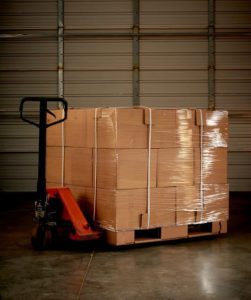The following is a guest post by Roger Ballentine, President of Green Strategies, Inc.; and Adam Pener, president and owner of a corrugated cardboard pallet manufacturer Green Ox and founder of Change the Pallet.
More so than ever, cities are taking the lead in adopting sustainable innovations that reduce climate impact, save money, and better the lives of their citizens. Cities were early adopters of clean energy, high efficiency lighting and other measures that are now mainstream.
While perhaps less sexy than solar panels on City Hall, cities can help drive another carbon emission-reducing technology into the mainstream by using lightweight, recyclable shipping pallets. By requiring vendor deliveries to municipal facilities on these lightweight, sustainable pallets, cities will save money, take trucks off the road, and reduce fossil fuel use.
The Math
Each year an estimated ten billion loaded wood pallets are shipped in the U.S. On average, wood pallets weigh about 50 pounds. By comparison, corrugated pallets (i.e., those made from industrial strength cardboard) weigh, on average, around 10 pounds. In pallet weight alone, swapping out wood for corrugated pallets would reduce the amount of annual U.S. trucking weight by 400 billion pounds. Making conservative assumptions with respect to road miles, gains in fuel efficiency, and the number of loaded pallets per truck, Change the Pallet and Green Strategies estimates a potential reduction of CO2e in the billions of tons.
Proven Global Model
In 2007, global retailer IKEA’s® worldwide supply chain used only wood pallets. After years of regional testing, IKEA® launched its worldwide “Handling Material No Wood” initiative in 2012. Today, the world’s largest private consumer of wood uses corrugated pallets for more than 98% of its 36 million annual global shipments. IKEA® reports that its HM-Now program has reduced its worldwide carbon emissions by ~500,000 metric tons. It also reports savings billions of dollars, which serves to reasons when shipping 1.44 billion fewer pounds of wood pallets each year.
Corollary Benefits
The positive benefits to IKEA cascaded through its global system. For example, it costs about $100 per ton in the U.S. to haul away wood pallets. Now, IKEA receives an estimated $100 per ton for recycling corrugated pallets. IKEA also reports fewer worker injuries and a more gender-balanced workforce.
Change Bid Specs to Change the Market
Without question, if cities, public hospitals, schools, colleges and universities requested shipments from suppliers on corrugated pallets, the opportunity to shape the market is great. This can be accomplished via bid specifications for products to be shipped on lightweight, recyclable pallets. Change the Pallet recommends a maximum pallet that weight of 13 pounds.
About the Authors
Roger Ballentine served President Clinton as Chairman of the White House Climate Change Task Force and Deputy Assistant to the President for Environmental Initiatives, and now advises many Fortune 500 firms as President of Green Strategies, Inc.
Adam Pener is the president and owner of a corrugated cardboard pallet manufacturer Green Ox. Pener founded Change the Pallet in 2015 and is now widely considered to be an expert with respect to the environmental, social, human and economic impact of wood pallets. Change the Pallet is an Oregon non-profit that was named a “Knowledgeable Partner” by the World Bank’s prestigious Connect4Climate initiative.

